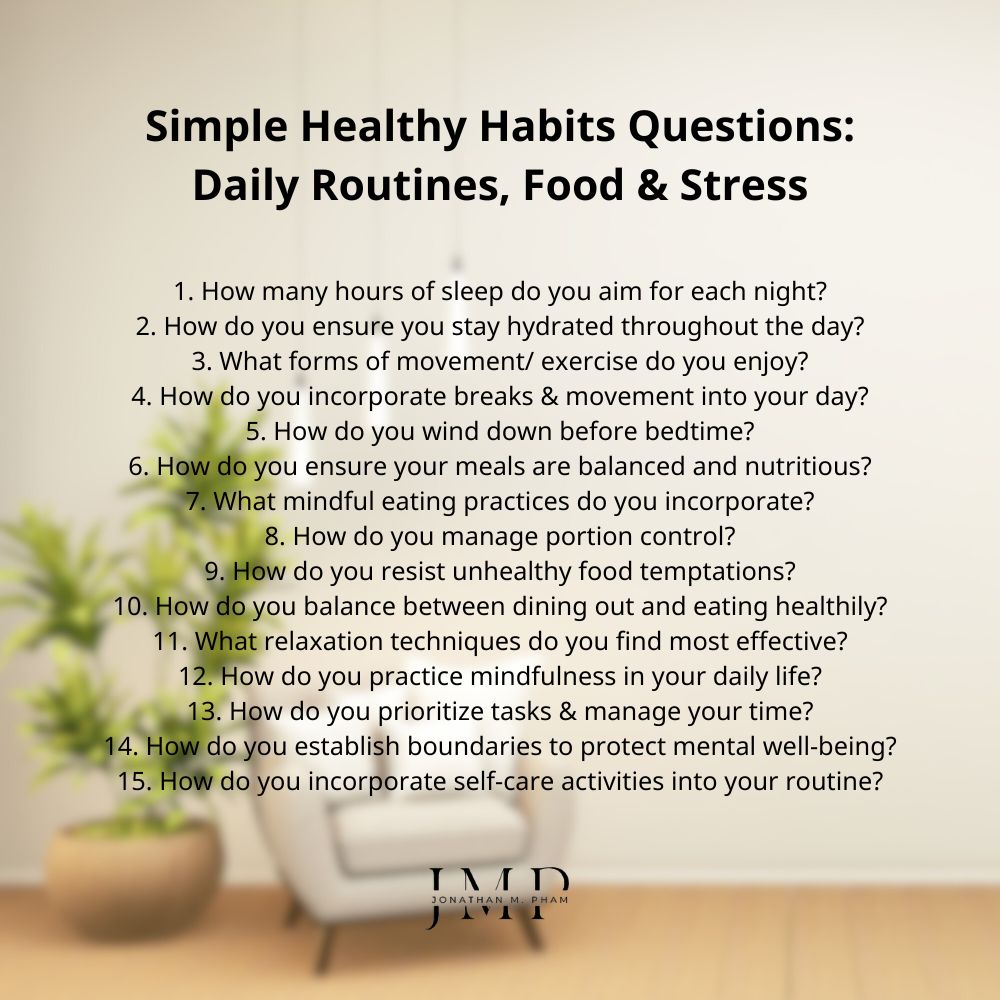Explore thought-provoking healthy habits questions – designed to inspire better lifestyle choices and bring about a more fulfilling life!
In today’s fast-paced world, prioritizing our own well-being has become more crucial than ever. Yet, with so many demands on the plate, it can be really challenging to carve out time for self-care and make healthy lifestyle choices consistently. In the article below, you will find a list of healthy habits questions designed to spark self-reflection and guide you on your journey. From daily routines to mental and emotional well-being, each question offers an opportunity for us to delve deeper into various aspects of life that often escape our attention.
Highlights
- Healthy habits are the building blocks for a fulfilling life as they empower us to manage our physical and mental well-being, leading to disease prevention, increased energy, improved mood, and greater self-esteem.
- To build and maintain such habits, start small, focus on progress over perfection, be kind to yourself, and leverage the power of support and scheduling.
- The questions below are curated to cover the following topics: daily routines, food choices, stress management, health issues, and lifestyle. In addition, a few deep prompts for discussions are also included.
Simple Healthy Habits Questions
Focus on everyday practices that can be easily integrated into each person’s daily schedule.
Daily routines
- How many hours of sleep do you aim for each night?
Quality sleep is essential for overall health and well-being. Strive for 7-9 hours per night to ensure your body and mind are adequately rested.
- How do you ensure you stay hydrated throughout the day?
Proper hydration is crucial for optimal bodily functions. Carry a reusable water bottle and aim to drink at least 8 glasses (64 ounces) of water daily.
- What forms of movement or exercise do you enjoy incorporating into your day?
Regular physical activity boosts mood, improves sleep, and reduces the risk of chronic diseases. Find activities you love, whether it’s walking, dancing, or yoga.
- How do you prioritize incorporating breaks and movement into your workday?
Sitting for prolonged periods often results in negative health effects. As such, it is recommended that you set reminders to stand up, stretch, or take short walks throughout the day to boost productivity and energy levels.
- What strategies do you use to wind down before bedtime and promote relaxation?
Creating a bedtime routine signals to your body that it’s time to unwind. Consider activities such as reading, meditating, or gentle stretching to prepare for a restful sleep.
Read more: Learning to Love Yourself – 16 Handy Tips for Fostering Self-esteem Every Day

Food choices
- How do you ensure your meals are balanced with a variety of nutrients?
Aim for a colorful plate filled with fruits, vegetables, lean proteins, whole grains, and healthy fats to provide your body with essential vitamins and minerals.
- What mindful eating practices do you incorporate to savor your meals?
Slow down, chew your food thoroughly, and pay attention to hunger and fullness cues. Mindful eating promotes better digestion and helps prevent overeating.
- How do you manage portion control without feeling deprived?
Use smaller plates, measure portions, and pay attention to serving sizes to maintain a healthy balance between enjoying your favorite foods and controlling calorie intake.
- What strategies do you use to resist unhealthy food temptations?
Keep nutritious snacks readily available, plan meals ahead of time, and practice mindful indulgence rather than strict deprivation to maintain a healthy relationship with food.
- How do you approach dining out or social gatherings while prioritizing healthy eating habits?
Scan menus in advance, choose restaurants with healthier options, and focus on enjoying the company rather than overindulging in high-calorie foods.

Healthy habits questions
Stress management
- What relaxation techniques do you find most effective in reducing stress?
Explore activities such as deep breathing exercises, meditation, progressive muscle relaxation, or spending time in nature to unwind and alleviate stress.
- How do you practice mindfulness in your daily life to stay present and reduce anxiety?
Incorporate mindfulness into routine activities like eating, walking, or even washing dishes. Focus on the present moment without judgment to cultivate inner calm and clarity.
- What strategies do you use to prioritize tasks and manage your time effectively?
Utilize to-do lists, prioritize tasks based on importance and urgency, and delegate when possible to reduce overwhelm and maintain a healthy work-life balance.
- How do you establish boundaries to protect your mental and emotional well-being?
Learn to say no when necessary, communicate your needs assertively, and recognize when to step back from obligations or situations that drain your energy or cause stress.
- How do you incorporate self-care activities into your routine to nurture your mental health?
Schedule regular “me time” for activities you enjoy, whether it’s reading, taking a bath, practicing hobbies, or simply unplugging from technology to recharge and relax.
Read more: 45 Mindfulness Questions for Adults – Daily Check-in Prompts for Better Clarity

Healthy habits questions for adults
Questions About Health Issues
Encourage self-awareness and responsible health management across various domains and topics.
Chronic conditions
- How do you manage your symptoms and maintain a positive outlook while living with a chronic illness?
Seek support from healthcare professionals, connect with others facing similar challenges, and focus on what you can control to enhance your quality of life despite the condition.
- What lifestyle modifications have you found helpful in managing your chronic condition?
Incorporate habits such as regular exercise, balanced nutrition, stress management techniques, and adherence to prescribed treatments to optimize your health and well-being.
- How do you communicate your needs and advocate for yourself in healthcare settings?
Educate yourself about your condition, prepare questions in advance, and assertively express your concerns, preferences, and goals to ensure you receive personalized and effective care.
- How do you cope with the emotional challenges that may arise from living with a chronic illness?
Engage in self-compassion, cultivate a strong support network, and seek professional counseling or therapy if needed to address feelings of grief, frustration, or isolation effectively.
- What resources or tools do you use to stay informed and empowered about managing your chronic condition?
Stay updated on reliable medical information, join support groups, use health tracking apps, and maintain open communication with your healthcare team to actively participate in your care.
Mental health
- How do you recognize signs of stress, anxiety, or depression in yourself or others?
Be mindful of changes in mood, sleep patterns, appetite, or behavior. Reach out for help if you experience persistent feelings of sadness, worry, or difficulty coping with daily challenges.
- What self-care practices do you prioritize to support your mental and emotional well-being?
Engage in activities that promote relaxation, self-expression, and connection, such as journaling, spending time with loved ones, practicing gratitude, or seeking therapy or counseling.
- How do you destigmatize conversations around mental health and encourage open dialogue?
Share your experiences, educate others about mental health, challenge stereotypes and misconceptions, and offer support and empathy to those struggling with mental health issues.
- How do you seek professional help or support when needed for mental health concerns?
Reach out to a therapist, counselor, or mental health professional for assessment, guidance, and treatment options tailored to your needs. Prioritize your mental health just as you would your physical health.
- How do you practice self-compassion and reduce self-judgment when facing mental health challenges?
Treat yourself with kindness and understanding, acknowledge that everyone faces struggles, and challenge negative self-talk by focusing on your strengths and progress toward healing and growth.
Read more: 35 Emotional Intelligence Questions for Attaining Self-mastery
Physical health
- What preventative measures do you take to maintain your physical health and well-being?
Prioritize regular check-ups, screenings, vaccinations, and healthy lifestyle choices to prevent illness, detect potential health issues early, and promote overall longevity and vitality.
- How do you incorporate physical activity into your daily routine to support your physical health?
Find activities you enjoy, set realistic goals, and vary your workouts to include cardiovascular exercise, strength training, flexibility, and balance exercises for overall fitness.
- What strategies do you use to manage pain or discomfort effectively?
Explore options such as heat or cold therapy, gentle stretching, massage, over-the-counter pain relievers, or complementary therapies like acupuncture or physical therapy for relief.
- How do you ensure you’re meeting your body’s nutritional needs and maintaining a healthy diet?
Focus on consuming a variety of nutrient-dense foods, including fruits, vegetables, lean proteins, whole grains, and healthy fats, while limiting processed foods and added sugars.
- How do you prioritize rest and recovery to support your body’s natural healing processes?
Allow time for adequate sleep, incorporate rest days into your exercise routine, listen to your body’s signals, and practice relaxation techniques to promote physical and mental rejuvenation.

Healthy habits questions
Preventative care
- How do you stay informed about recommended screenings and vaccinations for your age and risk factors?
Consult with your healthcare provider, keep track of your medical history, and utilize resources such as health websites or apps to stay up-to-date on preventative care guidelines and recommendations.
- How do you overcome barriers or hesitations about undergoing preventive screenings or vaccinations?
Educate yourself about the importance of early detection and prevention, address concerns with your healthcare provider, and consider the potential benefits and risks in making informed decisions about your health.
- How do you advocate for yourself in healthcare settings to ensure you receive recommended preventative care?
Ask questions, express your preferences and concerns, and actively participate in shared decision-making with your healthcare provider to tailor preventative care recommendations to your individual needs and preferences.
- How do you encourage loved ones or community members to prioritize preventative care and screenings?
Share information about the importance of preventative care, offer support in scheduling appointments or finding resources, and lead by example by prioritizing your own health and well-being.
- How do you navigate insurance coverage and financial considerations related to preventative healthcare?
Research available resources, review your insurance policy for coverage details, and explore community clinics or programs that offer low-cost or free preventative services to minimize financial barriers to care.
Healthy Lifestyle Questions
Explore broader aspects of well-being beyond physical health.
Creating healthy boundaries
- How do you communicate your needs and set limits in your personal and professional relationships?
Practice assertive communication, set clear boundaries, and prioritize self-care to protect your mental, emotional, and physical well-being while fostering healthy and respectful relationships.
- How do you recognize when you need to say no to additional commitments or responsibilities?
Listen to your body and emotions, assess your priorities and capacity, and honor your limits by declining requests or obligations that would exceed your available time, energy, or resources.
- How do you handle conflicts or disagreements assertively while maintaining respect and empathy?
Use “I” statements to express your feelings and needs, actively listen to others” perspectives, and collaborate on finding mutually beneficial solutions that honor the needs and boundaries of all parties involved.
- How do you establish boundaries around technology and screen time to prioritize real-life connections and activities?
Set designated times for device use, create tech-free zones in your home, and engage in activities that promote face-to-face interaction, creativity, and presence in the present moment.
- How do you reinforce boundaries when others may push against or disregard them?
Clearly communicate your boundaries, reinforce them consistently, and establish consequences or seek support from trusted individuals or professionals if others repeatedly violate your boundaries.

Healthy habits questions
Financial wellness
- How do you budget effectively to ensure financial stability and meet your financial goals?
Track your income and expenses, prioritize needs over wants, and allocate funds towards savings, debt repayment, and long-term financial goals to build a secure financial future.
- How do you distinguish between essential and non-essential expenses to make informed spending decisions?
Evaluate your priorities, identify fixed and discretionary expenses, and weigh the value and necessity of purchases against your financial goals and available resources before making spending decisions.
- How do you manage debt responsibly and work towards becoming debt-free?
Develop a repayment plan, prioritize high-interest debts, explore consolidation or refinancing options, and adopt frugal habits to accelerate debt payoff and regain financial freedom.
- How do you cultivate a healthy relationship with money and overcome financial stress or anxiety?
Practice gratitude for what you have, focus on financial goals rather than comparing yourself to others, seek support from financial professionals or support groups, and develop positive money habits to reduce stress and build confidence in managing your finances.
- How do you prepare for unexpected expenses or emergencies to maintain financial resilience?
Build an emergency fund, review insurance coverage, create a financial plan that includes savings for short-term and long-term goals, and explore additional income streams or side hustles to increase financial stability and flexibility.

Social connections
- How do you nurture existing relationships and cultivate new connections in your social circle?
Prioritize quality time with loved ones, reach out to friends or acquaintances to initiate conversations or activities, and participate in group activities or community events to expand your social network.
- How do you practice active listening and empathy to strengthen your relationships?
Focus on understanding others’ perspectives, validate their feelings, and offer support without judgment or trying to fix problems, fostering trust, intimacy, and mutual respect in your interactions.
- How do you handle conflicts or disagreements constructively within your relationships?
Approach conflicts with openness and willingness to find resolution, communicate calmly and respectfully, and focus on understanding each other’s needs and finding mutually satisfactory solutions to strengthen the relationship.
- How do you set boundaries within your social relationships to maintain balance and preserve your well-being?
Communicate your needs and limits clearly, assertively decline requests or invitations that don’t align with your priorities or values, and prioritize self-care to prevent burnout and resentment in your relationships.
- How do you support friends or loved ones who may be struggling with loneliness or social isolation?
Reach out regularly to check in, offer to spend time together or engage in activities they enjoy, and encourage them to seek professional help or community support if needed to overcome feelings of loneliness or isolation.
Read more: 180 Friendship Questions for Deeper Connections

Healthy habits questions
Discussion Questions About Health
Spark deeper conversations and reflections on health topics.
- How do societal norms and cultural beliefs influence our perceptions and behaviors related to health?
Explore how cultural values, media representations, and societal expectations shape attitudes towards body image, mental health, healthcare-seeking behaviors, and lifestyle choices, fostering discussion on the importance of cultural competence and inclusivity in healthcare.
- How can we bridge the gap between scientific evidence and public understanding to promote health literacy and informed decision-making?
Discuss strategies to communicate complex health information effectively, empower us to critically evaluate health claims and sources, and address disparities in access to accurate health information across different populations, fostering a culture of lifelong learning and evidence-based practice in healthcare.
- How do socioeconomic factors such as income, education, and access to healthcare influence health outcomes and disparities?
Examine the impact of social determinants of health on one’s ability to access resources, make healthy choices, and receive quality healthcare, sparking conversation on the importance of addressing structural inequalities and advocating for policies that promote health equity.
- How do personal beliefs, values, and experiences shape our attitudes toward health, illness, and healthcare?
Reflect on the role of spirituality, religion, past traumas, and lived experiences in shaping one’s perceptions of health, coping mechanisms, and healthcare-seeking behaviors, fostering dialogue on the importance of culturally sensitive and patient-centered care in promoting holistic well-being.
- How can technology and innovation be leveraged to improve healthcare delivery, patient engagement, and health outcomes?
Explore the potential of telemedicine, wearable devices, health apps, and artificial intelligence in enhancing access to care, promoting preventive health behaviors, and personalizing treatment approaches, sparking discussion on the opportunities and challenges of integrating technology into healthcare systems and practices.

Healthy habits quiz & questionnaire
Additional Healthy Habits Questions
Why are healthy habits important?
Our daily habits play a crucial role in shaping the foundation for a balanced and fulfilling life. They empower us to manage our physical and mental well-being effectively, hence enabling us to thrive in different aspects of life.
- Disease prevention: Regularly engaging in healthy habits like balanced eating and exercise can significantly reduce the risk of developing chronic diseases like heart disease, stroke, diabetes, and even certain types of cancer.
- Increased energy levels: Proper nutrition and physical activity work synergistically to boost our energy levels throughout the day, allowing us to be more productive and engaged in daily activities.
- Improved mood and well-being: Engaging in activities like exercise and spending time in nature releases endorphins, natural mood boosters that can combat stress, anxiety, and even symptoms of depression.
- Increased self-esteem: The process of taking care of yourself helps foster a sense of accomplishment, leading to increased self-esteem and confidence.
What makes a healthy habit?
A healthy habit isn’t just about the specific action itself, but rather a combination of factors that contribute to its overall positive impact on our well-being. Here are some key characteristics:
- Beneficial: The core of any good habit lies in its positive impact on one’s physical or mental health. This could be anything from eating nutritious foods to engaging in regular exercise or getting enough sleep.
- Sustainable: It needs to be something we can realistically incorporate into our lifestyle for the long term. Opt for small, achievable actions that can be consistently repeated rather than drastic changes that are difficult to maintain.
- Enjoyable: While some effort might be involved, ideally, the habit should be something one finds somewhat enjoyable, as it increases the likelihood of sticking with it over time.
- Integrated: Integrating the habit into our existing routine helps solidify it. This could involve linking it to another established habit, like taking a walk after dinner, or scheduling specific times for activities like meditation or journaling.
- Measurable: Tracking progress allows us to stay motivated and adjust the approach if needed. This could involve logging daily workouts, monitoring sleep patterns, or simply observing how the habit makes we feel.
- Supportive: Don’t underestimate the power of having a support system. Sharing goals with friends and family members, or joining a community can provide us with invaluable encouragement and accountability.
What are some health discussion topics?
When it comes to healthy habits questions, some discussion topics you may want to explore include:
Diet and Nutrition:
- The benefits of a balanced diet: Discuss the importance of consuming various food groups like fruits, vegetables, whole grains, lean protein, and healthy fats for optimal health.
- Debunking diet myths: Discuss common misconceptions surrounding fad diets and explore the importance of evidence-based dietary practices.
- Sustainable eating habits: Share tips and strategies for making healthy food choices that are realistic and enjoyable to maintain in the long term.
Physical Activity and Exercise:
- Finding the right type of exercise: Discuss different types of exercise, their benefits, and how to find activities you enjoy and can stick with.
- The importance of incorporating movement into daily life: Explore ways to increase daily physical activity beyond formal workouts, like taking the stairs or incorporating short walks throughout the day.
- The benefits of exercise for mental health: Discuss how physical activity can improve mood, reduce stress, and enhance cognitive function.
Mental health and well-being:
- Strategies for managing stress: Share effective techniques for managing stress, such as relaxation exercises, mindfulness practices, or seeking professional help if needed.
- The importance of sleep for overall health: Discuss the significance of getting enough quality sleep for physical and mental well-being.
- Destigmatizing mental health discussions: Encourage open and honest conversations about mental health challenges and the importance of seeking help when needed.
Preventative healthcare:
- The importance of regular checkups and screenings: Discuss the significance of preventive healthcare measures like regular doctor visits, screenings for specific conditions, and staying up-to-date on vaccinations.
- Healthy lifestyle choices for disease prevention: Explore how healthy habits like maintaining a balanced diet, exercising regularly, and managing stress can help prevent chronic diseases.
How to build & maintain healthy habits?
Building and maintaining healthy habits takes dedication and effort, but with the right approach, it should become a rewarding and sustainable part of your life:
- Start with a clear “why”: What do you hope to achieve by building healthy habits? Do you want to improve your energy levels, manage stress better, or prevent chronic diseases? Having a clear purpose keeps you motivated during challenging times.
- Choose small, achievable changes: Don’t overwhelm yourself by trying to overhaul your entire lifestyle overnight. Instead, focus on making small, manageable changes that you can realistically incorporate into your routine. For example, instead of aiming for a complete gym transformation, it is much better to start with a 15-minute walk three times a week.
- Schedule your habit: Treat your new habit like an important appointment. Block out time in your calendar and set reminders to ensure you don’t forget.
- Link it to an existing routine: Pair the habit with an established activity you already do. For example, listen to an audiobook while commuting, or do some stretches while watching TV.
- Think progress, not perfection: Everyone makes mistakes. Don’t let occasional setbacks derail your progress. Acknowledge the slip-up, learn from it, and get back on track with your routine.
- Be kind to yourself: Building healthy habits is a journey, not a destination. Be patient with yourself, embrace challenges as learning opportunities, and focus on making sustainable improvements.
- Share your goals: Tell a friend/ family member, or join a support group focused on similar goals. Sharing your journey can provide valuable encouragement and keep you accountable. Additionally, partnering with someone for exercise sessions or healthy meal planning should add a layer of fun and keep you motivated, especially on challenging days.
Read more: Life Management – How to Design a Life You Love

Healthy habits questions
Final Thoughts
Whether you’re looking to improve your nutrition, manage stress more effectively, or enhance your overall quality of life, the healthy habits questions above should help inspire you to make positive changes for a healthier, happier you. So, take this list with you, and let it serve as a guide to encourage better lifestyle choices and empower you to live your best life possible!
Other resources you might be interested in:
- 200 Self-reflection Questions: Toolkit for Life Pilgrims
- 250 Bucket List Ideas for Living Your Best Life
- 30 Growth Mindset Questions: Empowerment through Inquiry
- 70 Questions about Confidence: Blueprint for Fostering Self-Esteem
Let’s Tread the Path Together, Shall We?


